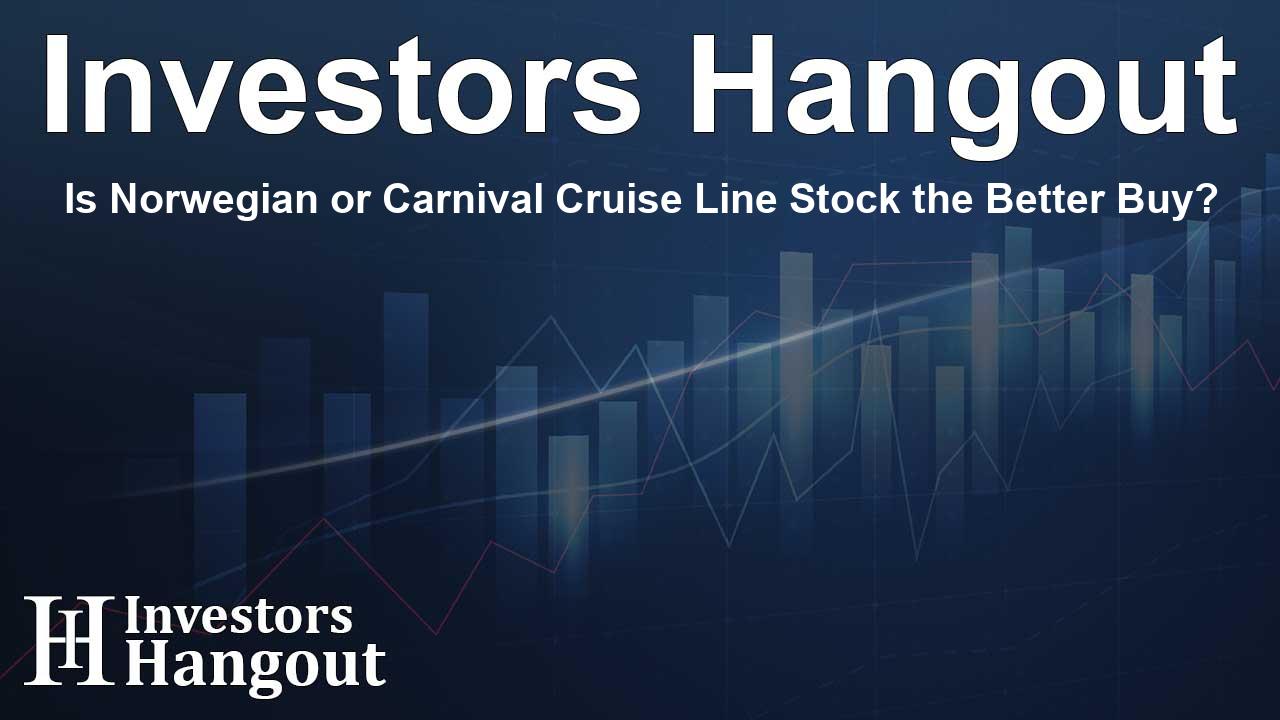Is Norwegian or Carnival Cruise Line Stock the Better Buy?

Analyzing Cruise Stocks: Norwegian and Carnival
When stock prices fall due to unforeseen circumstances, like a global pandemic, investors often find themselves on the lookout for promising recovery opportunities. The cruise industry faced severe hardships, experiencing a significant drop with voyages suspended and many companies accruing debt to navigate through troubled waters.
As the industry rebounds, it’s a great time to look at two of the leading players, Carnival Corporation & plc (NYSE: CCL) and Norwegian Cruise Line (NYSE: NCLH). Both of these companies are still down around 60% from pre-pandemic highs; assessing their potential for a market comeback could be incredibly insightful.
Revenue Recovery vs. Profitability
Before diving into the revenue and net income of these companies, it's essential to recognize the vast size difference. Carnival stands as a behemoth in the industry, boasting a market capitalization of approximately $21.7 billion, compared to Norwegian's $7.9 billion.
In the trailing year, Carnival Corporation reported revenue of $23.4 billion, reflecting a 14% increase from the same timeframe five years ago. CEO Jeff Weinstein asserts that this resurgence is indicative of shifting consumer attitudes and not merely a temporary spike in demand. He emphasized that the demand is based on evolving consumer consideration toward cruise brands and improved techniques to optimize ticket pricing.
Norwegian Cruise Line, on the other hand, also achieved remarkable sales figures, totaling $9.1 billion over the last year, marking a 43% increase from five years earlier. CEO Harry Sommer highlighted strong consumer demand leading to record-setting results and advanced ticket sales hitting new highs.
However, when it comes to profitability, the situation is nuanced. Over the last year, Carnival's net income was $904 million, significantly outpacing Norwegian's $420 million. That said, Norwegian does feature a superior operating margin of 13.3%, compared to Carnival's 12.1%. Both companies, however, still struggle with operating margins significantly lower than pre-pandemic levels.
Navigating Debt Issues
The cruise industry is inherently tied to high debt due to the cost of ships, and the pandemic exacerbated this situation across the board. Prior to 2020, Carnival's net debt was around $11 billion, which surged to $30.5 billion by the end of fiscal 2022. Currently, they have managed to lower their net debt to $27.7 billion, although they continue to face high interest expenses, totaling $1.4 billion in the last year.
Management is proactively addressing this debt, such as through prepayments of high-interest obligations to improve their financial stability. In contrast, Norwegian faced a rise from $6.6 billion in net debt to $12.8 billion as of mid-2024. Similar to Carnival, Norwegian recently reduced its interest payments, reflecting a fall to $775.2 million, which is considerably less than previous highs.
Choosing Between Carnival and Norwegian
Both Carnival and Norwegian, while facing parallel challenges, must focus on managing their debt to stabilize their finances effectively. Indicators of a recovery are present, with both companies demonstrating substantial revenue growth and the return to profitability. When considering an investment, comparing the valuations of both companies is crucial.
Both have recently increased their net income forecasts, which has positively impacted their valuation metrics. As investors, understanding the forward price-to-earnings (P/E) ratio is pivotal for determining which stock offers better potential. Currently, Carnival trades at 14 times forward earnings, while Norwegian is rated at a lower 11.6 times. This provides a more attractive entry point for potential investors.
For investors willing to navigate the challenges posed by high debt, Norwegian Cruise Line, with its lower valuation and manageable liabilities, presents as a more enticing option. The cruise industry is indeed on a recovery path, and carefully selecting which stock to invest in could yield significant future returns.
Investing in Norwegian Cruise Line
Before jumping into an investment decision, it's wise to consider various factors. Norwegian Cruise Line shows promising signs of recovery with a supportive financial environment, making it one to watch closely.
Frequently Asked Questions
What are the main differences between Carnival and Norwegian Cruise Line?
Carnival is significantly larger with higher revenue and net income, while Norwegian has a better operating margin and lower valuation.
How is the cruise industry recovering post-pandemic?
The cruise industry is experiencing increased demand, greater ticket sales, and renewed profitability, though debt management remains crucial.
Which stock has a better chance of turnaround?
While both stocks show promise, Norwegian's lower valuation and debt levels present a more attractive investment opportunity.
What should I consider before investing in cruise line stocks?
Investors should evaluate debt levels, revenue potential, and overall market conditions while considering their risk tolerance.
Is now a good time to buy stocks in cruise companies?
Current trends suggest potential for recovery, but it's essential to carefully analyze financial metrics and market conditions before deciding.
About The Author
Contact Hannah Lewis privately here. Or send an email with ATTN: Hannah Lewis as the subject to contact@investorshangout.com.
About Investors Hangout
Investors Hangout is a leading online stock forum for financial discussion and learning, offering a wide range of free tools and resources. It draws in traders of all levels, who exchange market knowledge, investigate trading tactics, and keep an eye on industry developments in real time. Featuring financial articles, stock message boards, quotes, charts, company profiles, and live news updates. Through cooperative learning and a wealth of informational resources, it helps users from novices creating their first portfolios to experts honing their techniques. Join Investors Hangout today: https://investorshangout.com/
The content of this article is based on factual, publicly available information and does not represent legal, financial, or investment advice. Investors Hangout does not offer financial advice, and the author is not a licensed financial advisor. Consult a qualified advisor before making any financial or investment decisions based on this article. This article should not be considered advice to purchase, sell, or hold any securities or other investments. If any of the material provided here is inaccurate, please contact us for corrections.
